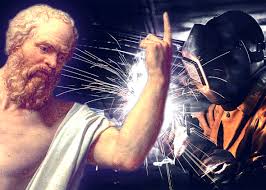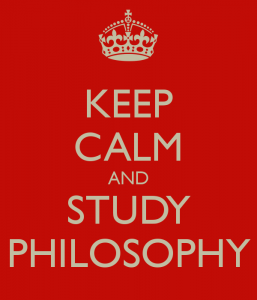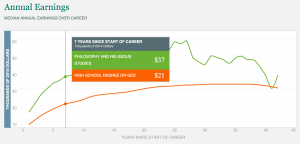After attempting to watch significant portions of the first three debates among the multitude of candidates for the Republican nomination for President, I chose not to watch round four the other night, figuring I could catch the high or low lights the next day on line. I was greeted with the following lead from Slate.com:
It was a tough night for philosophers at the fourth GOP debate. To make a point about skills training, Sen. Marco Rubio said the world needed more welders than philosophers.  Sen. Ted Cruz attacked “philosopher kings” for trying to figure out what was happening in the economy. And Gov. John Kasich, who tried at times to get philosophical and even quoted one—Michael Novak on the ethical duties of Wall Street—was clobbered by Donald Trump. “I don’t have to hear from this man,” Trump said after Kasich labelled him as untruthful.
Sen. Ted Cruz attacked “philosopher kings” for trying to figure out what was happening in the economy. And Gov. John Kasich, who tried at times to get philosophical and even quoted one—Michael Novak on the ethical duties of Wall Street—was clobbered by Donald Trump. “I don’t have to hear from this man,” Trump said after Kasich labelled him as untruthful.
My goodness. I’m sorry I missed it (not).
Don’t worry, I’m used to philosophers being trashed. Several years ago Jeanne and I were visiting my cousin and his wife for a few days and attended services with them on Sunday morning at their conservative, evangelical mega-church (something I would only do for someone I like a lot, and then only one time).  The pastor’s sermon that morning was about how important it is for Christian believers to live according to the precepts of the Bible and not to think too much about it. On several occasions he belittled those with too much education who urge people to think and ask questions about what they believe—we don’t need “philosophers” (using air scare quotes) telling us what we need to do when the Bible is perfectly clear, he repeated to a growing swell of “Amens.” My cousin’s wife was mortified. As she introduced me to the hand-shaking pastor at the exit door after services, he said with a beaming Christian smile “So nice to meet you! Where are you from and what do you do?” “He’s a philosopher,” my cousin’s wife said as his smile slowly faded.
The pastor’s sermon that morning was about how important it is for Christian believers to live according to the precepts of the Bible and not to think too much about it. On several occasions he belittled those with too much education who urge people to think and ask questions about what they believe—we don’t need “philosophers” (using air scare quotes) telling us what we need to do when the Bible is perfectly clear, he repeated to a growing swell of “Amens.” My cousin’s wife was mortified. As she introduced me to the hand-shaking pastor at the exit door after services, he said with a beaming Christian smile “So nice to meet you! Where are you from and what do you do?” “He’s a philosopher,” my cousin’s wife said as his smile slowly faded.
I won’t take the time to address Cruz’s comment about philosopher-kings, since anyone who has cracked the cover of Plato’s Republic knows that true philosopher-kings would never besmirch their minds and characters with such low-level drivel as economics. As for Rubio, in answer to how he would counter Democrats’ proposals for free or subsidized college education, he said “For the life of me, I don’t know why we stigmatize vocational education. Welders make more money than philosophers. We need more welders and less philosophers.”
http://www.youtube.com/watch?v=HP7vOx1ZCHE
Apart from not realizing that he meant “fewer” and not “less,” Rubio gained the distinction of being the first person to blame America’s economic woes on a surfeit of philosophers. The morning after the debate a Fox News interviewer opined to the senator that  “Plato would have been so much more successful if he had just welded and stopped yapping about his philosophy. Senator,” an insight that Rubio did not challenge. I’m glad to report, though, that a multitude of news outlets from the AP and the Washington Post to the New York Times and Money.com resisted throwing philosophers under the bus with headlines like “Marco Rubio is wrong on this,” “Sorry, Marco Rubio, philosophers actually make way more than welders,” “Marco Rubio is wrong: Working philosophers make almost twice as much as welders,” and so on (note, though, that it said working philosophers). Vox.com even provided helpful graphics to support philosophers, the first comparing earnings over time between welders and people with bachelor’s degrees in either philosophy or religious studies:
“Plato would have been so much more successful if he had just welded and stopped yapping about his philosophy. Senator,” an insight that Rubio did not challenge. I’m glad to report, though, that a multitude of news outlets from the AP and the Washington Post to the New York Times and Money.com resisted throwing philosophers under the bus with headlines like “Marco Rubio is wrong on this,” “Sorry, Marco Rubio, philosophers actually make way more than welders,” “Marco Rubio is wrong: Working philosophers make almost twice as much as welders,” and so on (note, though, that it said working philosophers). Vox.com even provided helpful graphics to support philosophers, the first comparing earnings over time between welders and people with bachelor’s degrees in either philosophy or religious studies:
and the second comparing the mean average wage of welders with people who teach philosophy or religion.
I appreciate the support, although it is unfortunate that Vox.com thinks that philosophy and religious studies are the same thing. Sigh.
The above gives me the opportunity to get on a high horse that I have been on occasionally in the years of this blog’s existence. The whole kerfuffle concerning welders and philosophers beginning with Sen. Rubio and continuing with reactions the next day was focused on money, on the apparently self-evident idea that the most, perhaps the only, important issue at hand is who makes more money. Of the dozen or so news sources I checked, I found only one that shifted the issue closer to where it belongs. The Weekly Standard argued that
There was far more wrong in Rubio’s assertion than the mangled grammar. For one, the idea that the only purpose of higher education is to make money is dangerously misguided. At its best, education makes us (as the term liberal arts implies) free men and women, and better citizens. And it’s bizarre, as Rubio seemed to suggest, to believe that anyone studies philosophy in order to get rich.
Now that would be bizarre—I’m exhibit A that one should not study (or teach) philosophy in order to get rich. But the Weekly Standard’s comments move the issue in a fruitful direction, away from “How much money do they make?” toward  “Why would anyone study that in the first place?”
“Why would anyone study that in the first place?”
Several years ago during my four-year stint as chair of the Providence College philosophy department, I found myself sitting at a table with several very concerned parents. It was during one of the summer orientation sessions for incoming freshmen, and these were the parents of students who had indicated interest in majoring in philosophy once their college career began in the fall. The question, expressed in various ways, that all of these parents wanted an answer to was “What on earth will my daughter/son be able to do with a major in philosophy?” This is a discipline-specific version of a broader, equally challenging question: What can one do with a liberal arts education? The answer I gave those worried parents some years ago also serves as the best answer to the second, broader question. My answer is “you are asking the wrong question.”
The life of human flourishing depends far more on the sort of person one is than on what one is doing and is more a matter of continual character development than of supply and demand.  Bringing Aristotle’s insights to the issue of liberal arts education, the best question to ask is not “What can I do with a philosophy major and a liberal arts education?”, but rather “What sort of person will a philosophy major and a liberal arts education help me become?” That is a question that will be answered through a vast variety of lives, only one of which is teaching philosophy. Philosophy and the liberal arts equip a person with a host of valuable transferable skills appropriate to the living of a flourishing life. Even a welder can benefit from philosophy—especially since philosophers earn more than welders. Thanks, Sen. Rubio, for helping bring that to light.
Bringing Aristotle’s insights to the issue of liberal arts education, the best question to ask is not “What can I do with a philosophy major and a liberal arts education?”, but rather “What sort of person will a philosophy major and a liberal arts education help me become?” That is a question that will be answered through a vast variety of lives, only one of which is teaching philosophy. Philosophy and the liberal arts equip a person with a host of valuable transferable skills appropriate to the living of a flourishing life. Even a welder can benefit from philosophy—especially since philosophers earn more than welders. Thanks, Sen. Rubio, for helping bring that to light.














